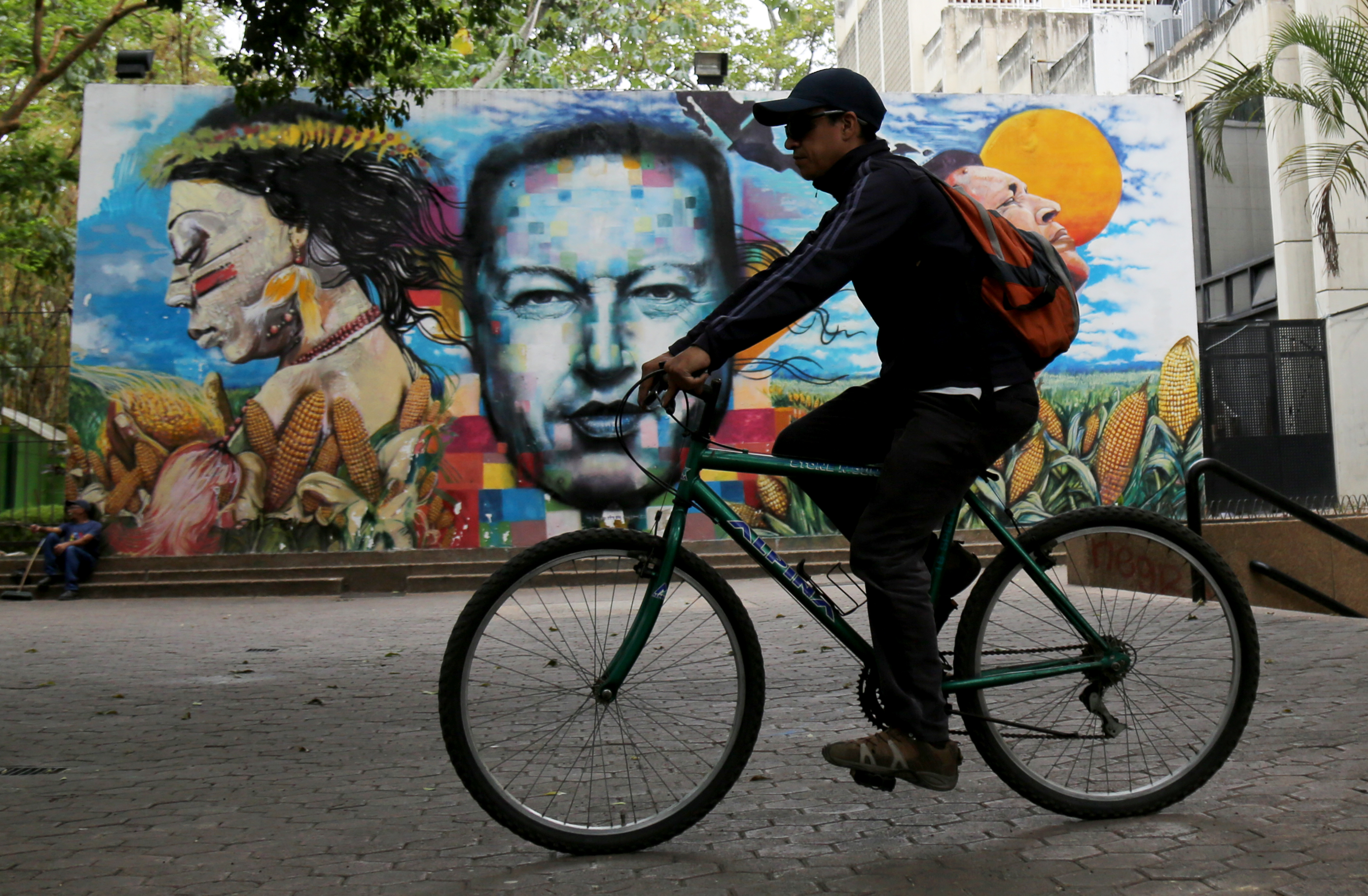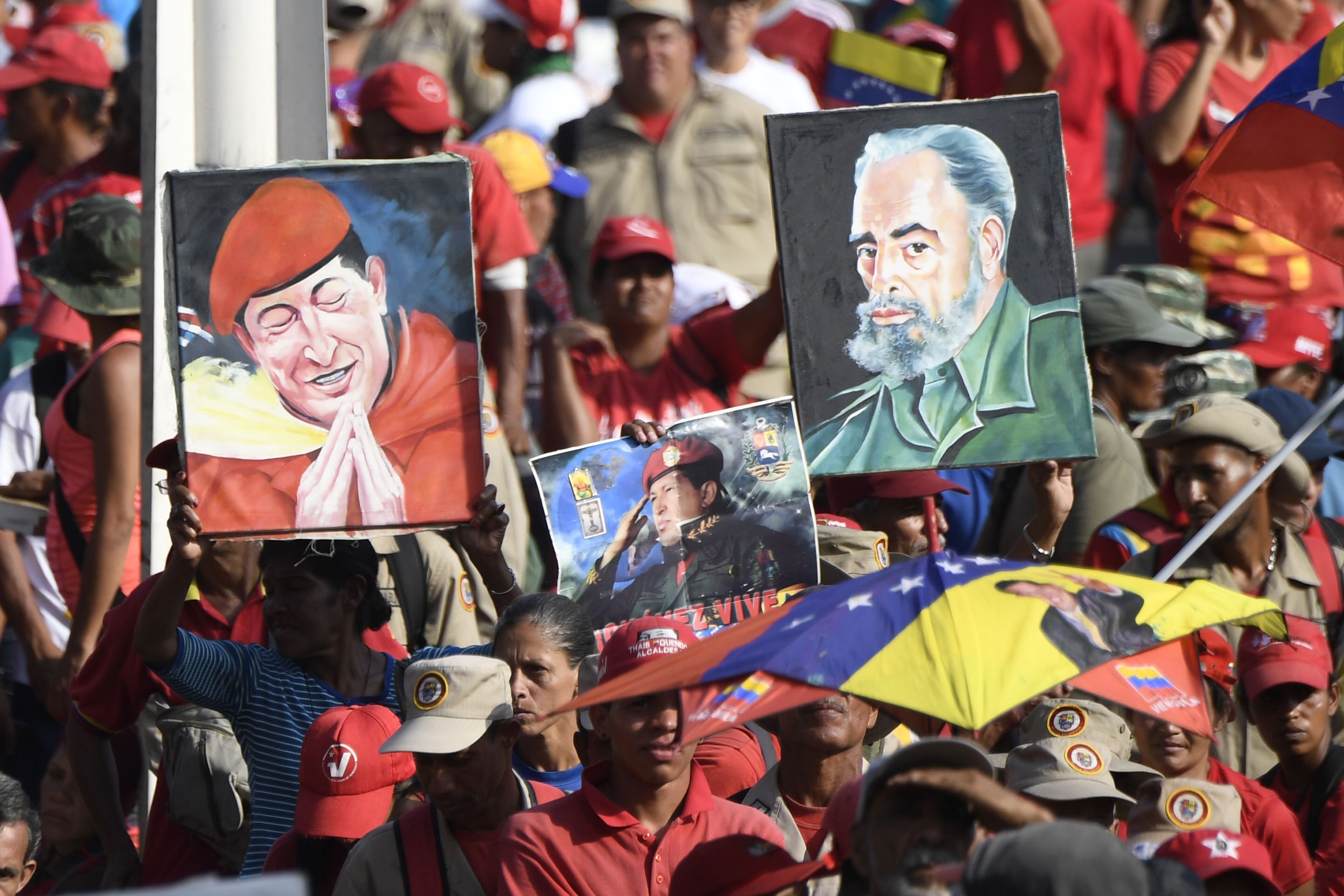
(Photo: Edilzon Gamez/Getty Images)
Early on the morning of April 30th, I was forwarded a shakily shot video of soldiers with Kalashnikovs drawn, circling white armored vehicles that had stopped traffic on one of Caracas’ busiest freeways. It came by way of a Venezuelan acquaintance living in Spain, one of many whom I now know in many corners of the world, pursuing lives in self-exile, exchanging among ourselves the latest news and hearsay about the country.
I receive so many of these videos that it can be hard to verify where they come from, whether they are indeed new, and whether they make it clear who’s perpetrating the violence. But as we’ve always said in Venezuela, lo que es verdad no es mentira: The truth is no lie. It sounds obvious, because it is. What’s true to me doesn’t make it so to someone else. Fake news can be real to whoever chooses to believe it, and misinformation spreads like a contagious disease under authoritarian regimes.
For 15 years, I let propaganda come between my father and me. The late Comandante Hugo Chávez Frías had been in power for over a decade. Even though in my twenties I too was enamored of him—of the idea of a leader with a social agenda, a political outsider who looked nothing like the previous white bureaucrats—just a handful of years into his presidency, I had completely fallen out of love with his revolution. In principle, I applauded his efforts to use oil profits to fund social programs, but over time, I saw Chávez defunding and attacking the country’s independent democratic institutions. My dad, though, hadn’t fallen out of love. To him, Chávez would become something of a messiah.
“You don’t understand what’s happening here,” he wrote me in 2005, in a short and frustrated email. “Because you’re there in ‘the empire,’ and whatever you’re hearing isn’t telling you about the many achievements of the revolution.” While I was reading about skyrocketing inflation and Chavez’s censorship of the media, my dad stubbornly defended the country’s state-subsidized health care and Chávez’s promise of a socialism for the 21st century.
For 15 years, we did not speak to one another, save the occasional birthday or New Year’s greeting. The reasons were much more complex than our political disagreements, as they can often be for people who should otherwise love each other unconditionally.
It all started when I left Venezuela as a 14-year-old with my mother, thinking I’d return after just a year in the United States. One year turned into two, then three, and then suddenly I’d been gone for 10 years. Dad kept saying he’d sent me letters that I never replied to. My mother said that he was failing to pay child support. All I knew was that I missed him and wished he’d come visit.
But as I found my own consciousness during my college years, I grew frustrated with his simplistic characterizations of Chávez as a selfless liberation hero, fighting against evil America. “He’s been brainwashed,” my mom and I would say, half-jokingly. We carried on with our lives in starkly different places, each sticking to the truth we’d chosen to listen to, unable to see the other’s reality.

Just a decade ago, my dad was blissfully remarried with two young children—my half-siblings Tian and Bibi—enjoying a middle-class life on the outskirts of Caracas. A geologist by training, he worked as a manager in the oil fields in Maracaibo, near the border with Colombia, earning enough money in a few months to support the family for the rest of the year. We barely spoke in those days, but I knew he was full of joy: This was the life he’d been seeking for a long time.
In 2009, as Chávez was preparing to get rid of term limits, I came back to Venezuela to cover the rallies for the BBC. I spotted my family as soon as the sliding gates opened: my dad, the tall hippie with the longish gray hair tied into a ponytail, still as handsome as I’d remembered, standing beside his wife, Joseth, a beautiful woman just a few years older than I. Tian and Bibi, the two siblings I barely knew, circled around my father excitedly, their squinty, smiley eyes and dark, wavy hair just like my own. We hugged each other tightly, awkwardly. I had just landed for my weeklong trip, but I told myself I couldn’t let another decade pass before coming to see them again. Do it for your brother and sister, I remember pleading to myself.

(Photo: Juan Barreto/AFP/Getty Images)
Despite our obvious physical likeness, there wasn’t much I seemed to have in common with my Venezuelan family then: My dad and Joseth were staunch supporters of the regime, to the point that they no longer spoke to family, friends, or neighbors who criticized Chávez. All of our long-term relationships with family friends had been severed by then; the children of those families, like me, were either already out of the country or eager to leave.
“Do you think you’ll ever come back?” a neighbor of my dad’s asked when I ran into him one morning. Then he answered his own question: “Aunque ya eres toda una gringa.”
He was right: After almost two decades living in America, I had become a gringa, not only in my dress and demeanor, but also in my allegiances. I carried an expired passport from Venezuela and a current one from the U.S.—a document that my dad’s young neighbor might well have coveted.
On my second day back in Caracas in 2009, a redheaded man in his twenties, a reporter from Catia TV—a community channel loyal to the regime—came up to me and insisted on asking me questions on camera. I refused. For the next four days, I ran into him wherever I went. “Think of me as a helper,” he told me. “I’m just here in case you need anything.” After his fourth appearance, I never saw him again.
But I was terrified: I’d been given a government minder in my own country. My father not only thought there was nothing wrong with this practice (“Chávez doesn’t trust the foreign media”); for the rest of my visit, each of our conversations would become a way for him to proselytize about the revolution.

This April, my father turned 77 years old. Early on the morning of his birthday, I tried to call him at home, but as is often the case given poor telecommunications infrastructure, my call wouldn’t go through. So I sent a WhatsApp message to Bibi: “We’re wishing dad a very happy birthday!” She replied, telling me that she and her mom had drawn him a card and baked him a cake. I knew this was a big deal; finding eggs and sugar in Venezuela is extremely difficult these days. But more importantly, Joseth and my dad, though still in agreement about politics, ended up fighting about everything else and finally separated about five years ago. They haven’t divorced because finding a lawyer in Caracas would be “too hard and expensive,” my dad says.
Thanks to a good friend who knows the ways of the cryptomarket, I’m able to send money that will eventually end up in my dad’s account at a much more favorable exchange rate than the one established by the Venezuelan government. I’d sent $100 the week of his birthday, asking him to use some of it on food, saying that he should splurge by buying some meat or fresh vegetables and fruit, all of which are wildly overpriced in Venezuela. He claims he doesn’t need any extra food: Every month, he receives a CLAP cardboard box of government-subsidized food (known by the acronym for Venezuela’s Local Supply and Production Committees) that contains cooking oil, pasta, rice, and some other things. He’s lost 20 pounds in the last couple of years; the tall, handsome hippie I last saw three years ago is now way skinnier and weak, Tian and Bibi tell me.
“He’s so blinded by the revolution that he fails to see how the government broke his legs just so that it can hand him some crutches,” says Tian, who’s now 18 and trying to save up to leave the country eventually.
Yet my dad remains as staunch a supporter of the Maduro regime as ever. He spends most of his days inside his bedroom in the run-down house he’s been living in since I left, where the sound of political jingles and Maduro speeches can be heard from the state TV channel he keeps on at all times, my siblings tell me. Besides the CLAP food aid, he still receives free medical care, something he’s become increasingly dependent on as he gets older. He was on his way to a doctor’s appointment in downtown Caracas when I first got the news of the most recent attempted coup, just days after his birthday.
“Dad left the house before 6 a.m.,” Bibi told me via WhatsApp. “I’m really worried.” Her school was closed until further notice; all major roads by then had been blocked and the news reports, as always, were conflicting: Had it been a military coup, or an uprising? Was the U.S. really behind it? What would happen next?
Bibi, Tian, and I spent much of the day trying to call my dad, worried he’d end up near the street protests or the armored tanks. We knew he was on foot, and that the public transportation system had shut down for the day. After almost 12 hours, we finally got through to him. He was hitching a ride on the bed of a food delivery truck driven by a fellow Chavista, he said.
“I’m so relieved,” he would tell me later. “The coup failed this time, but I’m sure there will be others.” For the first time in years, I found myself agreeing with him.
As far as I know, things in Caracas have returned to something like normal. Bibi and Tian are back to school, and there haven’t been any more water or power outages since before the last attempted coup. My dad is staying indoors, though, spending hours each day listening to state TV while he tries to fix up the house; if he can find a buyer, he says, he will use the money to start a new life elsewhere. No matter where he ends up, he tells me, he’ll keep believing in the revolution.

Pacific Standard’s Ideas section is your destination for idea-driven features, voracious culture coverage, sharp opinion, and enlightening conversation. Help us shape our ongoing coverage by responding to a short reader survey.





